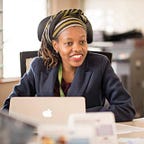Break the Bias — International Women’s Day 2022
To mark the International Women’s Day(IWD), 2022, I chose to write this piece like my journal entry.
Dear Diary,
The day is 31st March, 2022. I feel pretty spent out by this month because too many things happened both in my personal life and in the immediate environment. I had to contend with family emergencies, a 10 day work field trip that would leave my energy completely sapped by end of the day, a neighbourhood that was increasingly becoming unsafe with numerous reports of house break ins at night , and a reminder of how violence against women in the form of harassment is far from over in the society. It has been a handful navigating all this. Not such a happy IWD, but we commemorate nonetheless. How have you been holding up?
I once read what the late Toni Morrison said regarding a time of crisis to a fellow author :
“This is precisely the time when artists go to work. There is no time for despair, no place for self pity, no need for silence, no room for fear. We speak, we write, we do language. That is how civilizations heal.”
Trigger Warning : Sexual harassment conversations will be cited from this point onwards.
Remembering these statements by Toni Morrison, nudged me out of my numbness. The numbness of the story of a woman in Nairobi, Kenya who accidentally hit a boda boda(motorbike) rider and as a result was sexually harassed by a mob of men. The incident happened on 7th March, 2022, the eve of IWD.The video went viral. I didn’t watch it even though it circulated on all possible social media platforms. I could not bring myself to do so. The descriptions were enough. I heard that she let out screams. I heard that they started to tear her clothes as they touched her body. All this was very triggering and I became numb. To support myself and to educate others, I implored people with my WhatsApp number, not to further share the video. Her privacy at this time was far more important than our need to ‘spread the word’. Indeed, it is because of the virality of the video that the police and other agencies acted on this incident, but it served no purpose to continue to share it. I thought to myself I need to write a few thoughts about this incident happening at the backdrop of IWD.
The theme for this years IWD was #BreakTheBias. On that incident I ask, what biases do you hold against women in general? What biases do you have against women who drive for example? What biases do you have regarding women’s safety? Some years back, in the middle of a conversation about women and equality a group of men quipped “ haven’t you noticed? women drive more cars than men in this city. The big cars for example, so many women are driving them nowadays. Women are becoming more monied than men.” I challenged them to show me the actual statistics to prove this claim. They couldn’t prove it but the conversation was instantly deflected. I was not surprised by this turn of events. It is common in conversations where you seek to challenge gender stereotypes, particularly on women, that you get passionate claims with minimal backing.
What is a bias? The Merriam-Webster dictionary defines it as “an inclination of temperament or outlook, especially a personal and sometimes unreasoned judgment.”
I will add that, with regards to gender biases, oftentimes they can be subconscious. This is to say , the unconscious attitudes individuals hold in the part of their mind that is unaware and affect the way they think and feel about others around them. Gender biases are held by observing society and familial environments which inculcate certain attitudes on how different genders should be or not be.
There are various biases the society has against women for example, that they can be subjected to violence whenever anyone feels aggrieved by them and it will be ‘deserving’. Or that they cannot hold certain positions or own certain things like land, cars. I think of the woman who was a victim of harassment, what biases did the collective group of men hold against women for them to react that way? What has society encouraged as a culture, therefore further ingraining the biases on sexual harassment of women? For this incident, it would probably take one man or a group of men stepping up to stop the other men. To deescalate the situation. But they didn’t, until the police arrived. It need not to get there. As I draw parallels between that conversation with those men years back and this incident, I can’t help but think of how deeply ingrained the biases against women are. The biases that encourage society to have women violated publicly and privately as a norm, the biases that encourage society to have disdain for women to own property, to do activities such as driving. The biases that do not make space for women and indeed other gender minorities to be human beings who make mistakes and not to be judged harshly in comparison to men. And the list goes on…
When we think of breaking the bias, these are some of the questions I think we should be asking ourselves, and these incidents should be remembered to help us collectively challenge the status quo. We can all unlearn biases, but it takes intentionality, proper education that involves constantly questioning, why do we do what we do and the willingness to give up the power that these biases give us in different contexts.
To all the victims and survivors of sexual harassment, to the woman who was deeply traumatized on Wangari Maathai road, Nairobi on 7th March, 2022, I see you and am so sorry that the society failed you. I wish for your healing, for all of our healing 💌.
